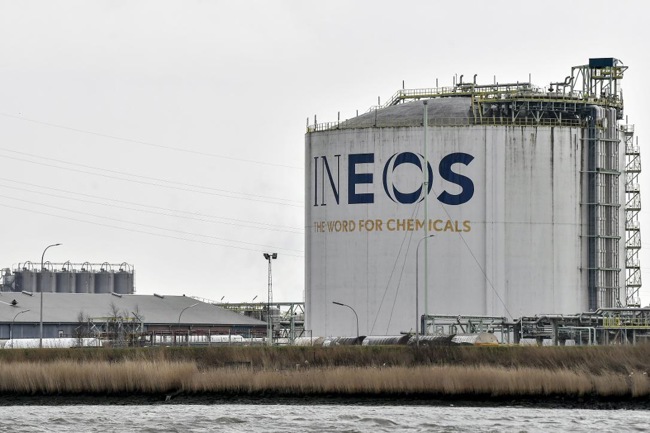After years of debate on the topic fuelled by climate NGOs' rejection of it, Flanders has given the green light to the construction of a chemical plant in Antwerp – criticised by many as a move that will further deepen the region's fossil-fuel dependency.
On Thursday morning, Flemish Environment Minister Zuhal Demir announced a permit had been granted for the construction of 'Project One' by INEOS in the port of Antwerp, rejecting an administrative appeal by 14 associations and organisations against the so-called "ethane cracker," which essentially relies on fossil fuels to make a basic product for plastic production.
"What we find very striking in the government's communication about this project is how it is branded as 'less polluting.' Some very important aspects of the project are left out of consideration," Arno Kempynck, a spokesperson for INEOS Will Fall (IWF), one of the organisations that opposed the project, told The Brussels Times.
Ethane crackers are plants that perform the first step in the process of transforming ethane – a by-product of shale gas, one of the most polluting fossil fuels – into plastics products. According to Kempynck, the government fails to transparently communicate the negative ecological impact of this process.
Aside from running on ethane, which is extracted by the ecosystem-destroying fracking system, and has to be transported by polluting ships from the other side of the world, the plant's conversion of ethane to ethylene is also bad. "Ethylene is a basic product for plastic, and most of it is used for disposable plastic, which we should also be avoiding."
The lesser of two evils
Project One emits 168 tonnes of nitrogen oxides (NOx) on an annual basis and – through the installation of the SCR (selective catalytic reduction) mechanism – 18 tonnes of ammonia. Demir acknowledged the problem but called the emissions the "lesser of two evils".
"By way of comparison: the previously denied gas-fired power stations emitted at least twice as much NOx (340-500 tonnes) and five to six times as much ammonia (100 tonnes)."
The Government has also requested that INEOS makes the plant climate neutral within 10 years from the start of the operation, but only "if the technologies and infrastructure are available at that time."
Natuurlijk zijn we niet blij met de vergunning voor Ineos. Hiermee kiest Vlaanderen voor fossiele industrie terwijl we er net van moeten afstappen. Een aantal argumenten die Ineos aanhaalt zijn quatsch en wilde ik even rechtzetten. 1/nhttps://t.co/uNfdNs2tOe
— Tycho Van Hauwaert (@Tycho_vh) June 9, 2022
Tweet Translation: "Of course, we are not happy with the permit for Ineos. With this, Flanders is opting for the fossil industry, while we should be moving away from it. A number of arguments put forward by Ineos are nonsense and I wanted to correct them."
In its own communication, INEOS has said the ethane cracker will have the "lowest carbon footprint in Europe." Importantly, Kempynck stressed that this aspect of the company's greenwashing, a story which the government has completely gone along with, is an internal contradiction.
"It is like advertising the most diet-friendly bag of chips. You just cannot create plastic using fossil fuels and then call that climate-friendly," he said.
Kempynck added that this plant is not replacing a more polluting one, and the fact that there is no need for extra ethylene production, only adds to the argument of why the creation of this plant is unnecessary. "If there is to be innovation, there should be more focus on recycling and circular projects and not at all on fossil projects that rejuvenate plastic production."
'Wasting tax-payers' money'
Aside from being ecologically harmful, the project is also economically risky due to the overproduction of ethylene, according to NGOs trying to halt the construction of the chemical plant.
"Banks know the fossil industry is a finite story, which is why they refused to finance the investment unless the government guarantees it. So the project stands or falls with the support of Flemish tax money," Kempynck explained.
Related News
- Environment minister and activists clash over Belgium's climate goals
- Belgium among worst performers regarding climate policy
The government has to guarantee up to half a billion euros in taxpayers' money for this project. It is now up to Flemish Minister for Labour, Economic Affairs, Innovation and Agriculture, Jo Brouns, to decide whether the guarantee will be given. His cabinet told The Brussels Times that it could not comment on the matter yet.
Meanwhile, the NGOs and IWF will continue to contest the project, which they believe will not see the final light of day. "We are going to put pressure on Minister Brouns and various NGOs will be appealing the decision from Demir."

